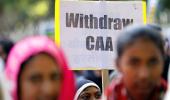"Can a 4-month-old child be taking part in such (Shaheen Bagh) protests?" the Supreme Court asked on Monday while warning some women lawyers for making 'explosive submissions' that children participating in these anti-Citizenship Amendment Act demonstrations are being called names, 'terrorist', 'gaddar' (traitor), 'Pakistani', in school.

"Don't make explosive submissions. Please do not make such statements. We do not want people to use this platform to further create problems," said a bench, comprising Chief Justice S A Bobde and Justices B R Gavai and Surya Kant, when two women advocates instantly started making submissions.
When the bench said it was taking suo motu cognisance of the letter written by a national bravery award winner Zen Gunratan Sadavarte, seeking that minors be barred from participating in any type of protest and agitation, the advocates interrupted claiming that children participating in the protest are being called names, 'terrorist', 'gaddar' (traitor), 'Pakistani', in schools.
"They (children) come home crying," they submitted.
The intervention by advocates Shahrukh Alam and Nandita Rao, did not go down well with the bench, which said: "We will not hear you on this. Don't make such types of irrelevant arguments."
Solicitor General Tushar Mehta opposed them saying, "Can it be a ground for sitting on dharna with a four-month-old child or can they oppose this on the ground that children are being called names like gaddars in school."
The bench asked, "A four-month old infant had gone to protest? But tell us which four-month-old child goes on its own to protest sites."
Advocate Alam said she was appearing for mother of two daughters and given that India has ratified UN Conventions on children's right to protest it was not appropriate for the apex court suo motu taking up the matter.
The bench said the two lawyers were deviating from the main issue of which it has taken cognizance of.
"We are not considering either CAA or NRC. We are not considering the abuses like Pakistani hurled in schools," the bench said.
The bench made it clear that it was not stifling anybody's voice.
"We are not stifling any voice. This is a properly constituted suo motu proceedings by the Supreme Court of India," the bench said.
"We have the highest respect for motherhood, and highest concern for children. Don't make arguments to raise and create guilt," the bench said.
"A child has died. Instead of causing more trouble, mothers should back this cause," the bench said.
The lawyers had submitted that 'these women (who are sitting at protest site) live in slums and have no option but to take their children along to the protest site'.
"The right of children to protest is also recognised under the UN convention...and children are brought along to fairs, jagratas etc where also they could be at a risk of some harm," Alam submitted.
The two women lawyers said they were seeking intervention on behalf of journalist and activist John Dayal and a woman who is the mother of two children.
The four-month-old baby had passed away in his sleep on the night of January 30 after returning from Shaheen Bagh where his parents had taken him during the anti-CAA protest.











 © 2025
© 2025